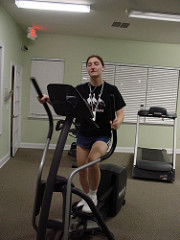
Staying trim and healthy is crucial for most people — which is why setting up an exercise regimen is so crucial. According to research studies, only two core varieties of exercise are usually successful; as a result, it is crucial to take care in choosing the type of exercise you do.
Since so many people have trouble with the motivation to exercise, choosing the most efficient kinds of exercise is critical, due to the fact that the less time you spend exercising – and the less time you throw away on exercise that is not efficient – the more likely you will be to continue to exercise and therefore to reach your personal weight and strength target.
The first type of exercise that has been consistently shown to assist people to lose the pounds and get healthful is progressive resistance. In sum, progressive resistance is one type of strength training. It functions by progressively ramping up the amount of weight that you lift, the number of sets, and number of repetitions performed. As a result, your muscle fibers are not strained or subjected to damage – instead, they slowly and steadily strengthen without any setbacks.
Our second type of exercise that was studied thoroughly is cardiovascular training. This name is given to any type of exercise that gets the heart rate up to 60 – 85 percent of its maximum. Some examples of cardio training may include jogging, jumping rope, aerobics, or running on a treadmill, as well as other types, but it is your choice.
Even though progressive resistance and cardio training by themselves have been discovered to be highly efficient kinds of exercise, we now know that the combination is the best bet for achieving success. If you combine both progressive resistance and cardio training, you will strengthen muscle groups and develop whole-body endurance. According to a recent study, exercisers who performed both cardio and progressive resistance during a two month time period lost 45 percent more weight than exercisers who did cardio training or progressive resistance alone.
Just as crucial as the type of exercise you perform is, the way in which you exercise is also vital. It no doubt will be unsurprising that being consistent is what you should seek. Exercising irregularly may strain your muscles and will probably not assist you to build strength and endurance. In addition, it is unlikely to improve your overall health. According to most researchers, the ideal routine is to exercise for 40 minutes to an hour 3 – 5 times per week.
Unfortunately, it turns out that for a significantly sized percent of people, getting enough exercise is not as simple as dropping in at the health club 3-5 times every week or listening to what scientists write. For this group of people, the motivation to exercise is the big issue – this group of people simply doesn’t have the motivation to go to the gym. Actually, they might resist all exercise, which can lead to problematic anxiety.
Nobody knows what percentage of the American population has to deal with problems with the motivation to exercise, but researchers say that up to 20 to 40 percent of people say that they “hate” or “dread” exercise. An even larger group of people might have milder exercise motivation problems, feeling that even though it is relatively simple to commit to an exercise routine for a short period of time, motivation eventually disintegrates, leaving them back where they started – out of shape and overweight.
If you happen to be the kind of person who struggles with the motivation to exercise, fortunately, there are some easy methods to handle the struggle. In a recent study, volunteers who needed to begin an exercise program received a brief learning program that aided them to choose the right kinds of exercise, were provided with a therapist who specialized in exercise motivation, and received a brief series of sessions with a hypnotist. After six months, they were re-evaluated. Surprisingly, it turned out that over 85 percent of the participants had adhered to an exercise program during the entire six months. Even better, they generally lost an average of 15 more pounds than the control group.
If you are interested in this study, it could make sense to investigate the possibility of finding a motivational therapist, habit control therapist, or counselor who specializes in hypnotherapy. These types of therapists are provided with special training in aiding people to overcome anxieties, develop the motivation to exercise, and reinforce the development of good habits. Another possibility for exercise motivation is self-hypnosis – which is a simple and inexpensive practice that often helps individuals develop control over their own unconscious powers of motivation.
Hypnosis therapy and self-hypnosis are safe ways of increasing motivation that are proven to be successful in the case of exercise motivation. Hypnotherapy works by making use of hypnotic relaxation to elicit the abilities of the unconscious to influence behavior modification and habit development. Hypnosis therapy is a good choice for people who are exercise adverse because it is able to help increase the drive to get healthful and lose the weight easily and effectively.
You must be logged in to post a comment